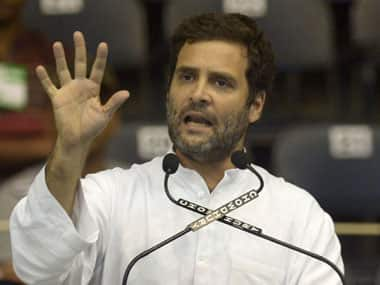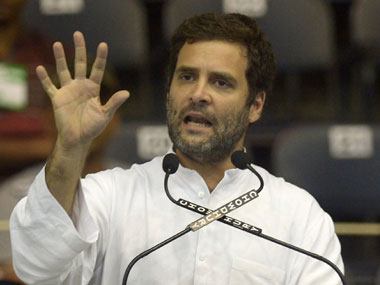New Delhi: It seems like Rahul Gandhi is finding inspiration in places he has never looked before, in his renewed battle against Modi. The way Gandhi has been backing some of the Prime Minister’s adversaries, it looks like he is following Kautilya’s Arthashastra quite diligently. For ones unaware of it, Kautilya’s Arthshastra is an ancient Indian treatise on statecraft, which says that treating your enemy’s enemy as your friend may reap rich dividend. In the same vein, Gandhi is now going out and courting people who have a bone to pick with PM Modi. After taking up the ‘cause’ of aggrieved farmers and middle-class home buyers, now Gandhi has assured the civil society that he would stand for their rights. A group of civil society members from across the country met Gandhi at his residence on 4 June and apprised him of the urgent need to counter threats from right-wing fundamentalists, who seem to be drawing sustenance from the fact that the BJP is the helm of the government at the centre. They also alleged that the RSS-BJP combine have led to a sharp rise in communal differences. Following an hour-long discussion, the Congress vice president assured the delegation comprising activists and civil society members from various sectors that he would take up the issue with his party. [caption id=“attachment_2283502” align=“alignleft” width=“380”]  Rahul Gandhi. AFP.[/caption] Greenpeace was also a part of the delegation that met Gandhi. The first encounter of a civil society organisation with the Modi government happened in June 2014, when the leaked Intelligence Bureau (IB) report stated ‘Greenpeace is a threat to national economic security’. It was followed by blocking of the NGO’s foreign funds. On 11 January this year, Greenpeace India’s campaigner Priya Pillai was stopped from boarding her flight to London, where she was to meet the British Parliamentarians. RTI activist Nikhil Dey, who was part of the delegation that met Gandhi, said, “Whatever is happening at present is a big threat to our Constitution and democracy. The voice of civil society has been curbed. Even ordinary citizens including tribals and farmers are unable to raise their voices against atrocities. The Right to Information (RTI) in also under threat, as there’s no legitimate reason why the appointment of a chief information commissioner was delayed for nine months. We urged Rahul Gandhi that the Congress and other political parties need to protect the democratic right to expression of our citizens.” “Rahul Gandhi was well informed about the issue and was affirmative. He agreed that the corporate culture has permeated in the political arena and there is hardly any dialogue between the civil society groups and the government. He also agreed that there has been a systematic attack on civil society through a network of larger forces,” said Tapan Bose, general secretary, South Asia Forum for Human Rights. Added MJ Vijayan, general secretary, Programme for Social Action, “We’re pushed to fight at several fronts, as the whole space of democracy has got shrunk. Anybody opposing government policies is drubbed as anti-national.” Post-sabbatical, Gandhi has emerged in a new avatar and seems to be grabbing every opportunity to reclaim the ground lost by his party. He took up the controversial Land Acquisition Bill by being vocal both inside and outside the Parliament. The farmers found a new voice in him, ad Gandhi seemed like the person who could stop the NDA’s amended land bill from becoming an act. Delhi-based political commentator Neerja Chowdhury said, “Rahul Gandhi now appears to be comfortable in a clear cut role as the leader of the opposition party. Imbibing a left of centre image, he’s trying to widen his base by reaching out to the aggrieved sections. Even in the past, he espoused the cause of the Dalits and poor farmers in Bundelkhand. There’s positively a visible change in him as he’s now getting into the shoes of a full time politician. In the last two decades, an aspirational class has emerged that wants a change and as a result Arvind Kejriwal was voted to power in Delhi and Narendra Modi in India. This section can’t be ignored, which Rahul seems to have understood.” “His party also seems to have found its faith back in him. The forthcoming state elections will be a test for him to prove his leadership quality. After all, it won’t be easy for the Congress to win,” she added. Besides discussing issues related to environmental and forest rights, labour reforms, child labour, human trafficking, employment security, etc, the delegation urged Gandhi to push for bringing all Intelligence agencies under the purview of the Parliament and the Comptroller and Auditor General. They demanded that the Congress party should reiterate its support to the National Policy on Voluntary Sector 2007, formulated during the UPA regime and create a working committee to interact with civil society members to formulate a public policy for voluntary organizations.
It seems like Rahul Gandhi is finding inspiration in places he has never looked before, in his renewed battle against Modi.
Advertisement
End of Article


)
)
)
)
)
)
)
)
)



